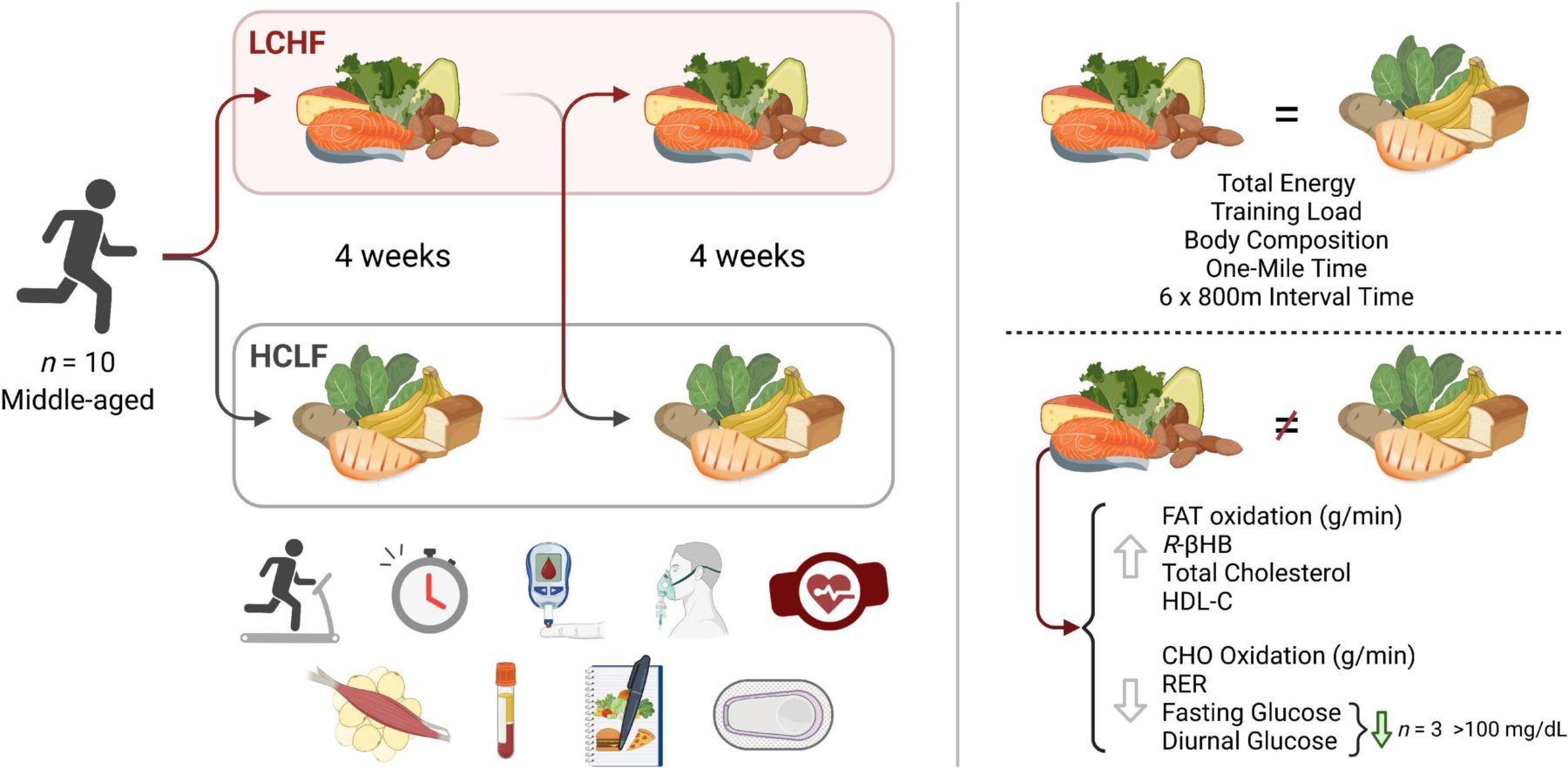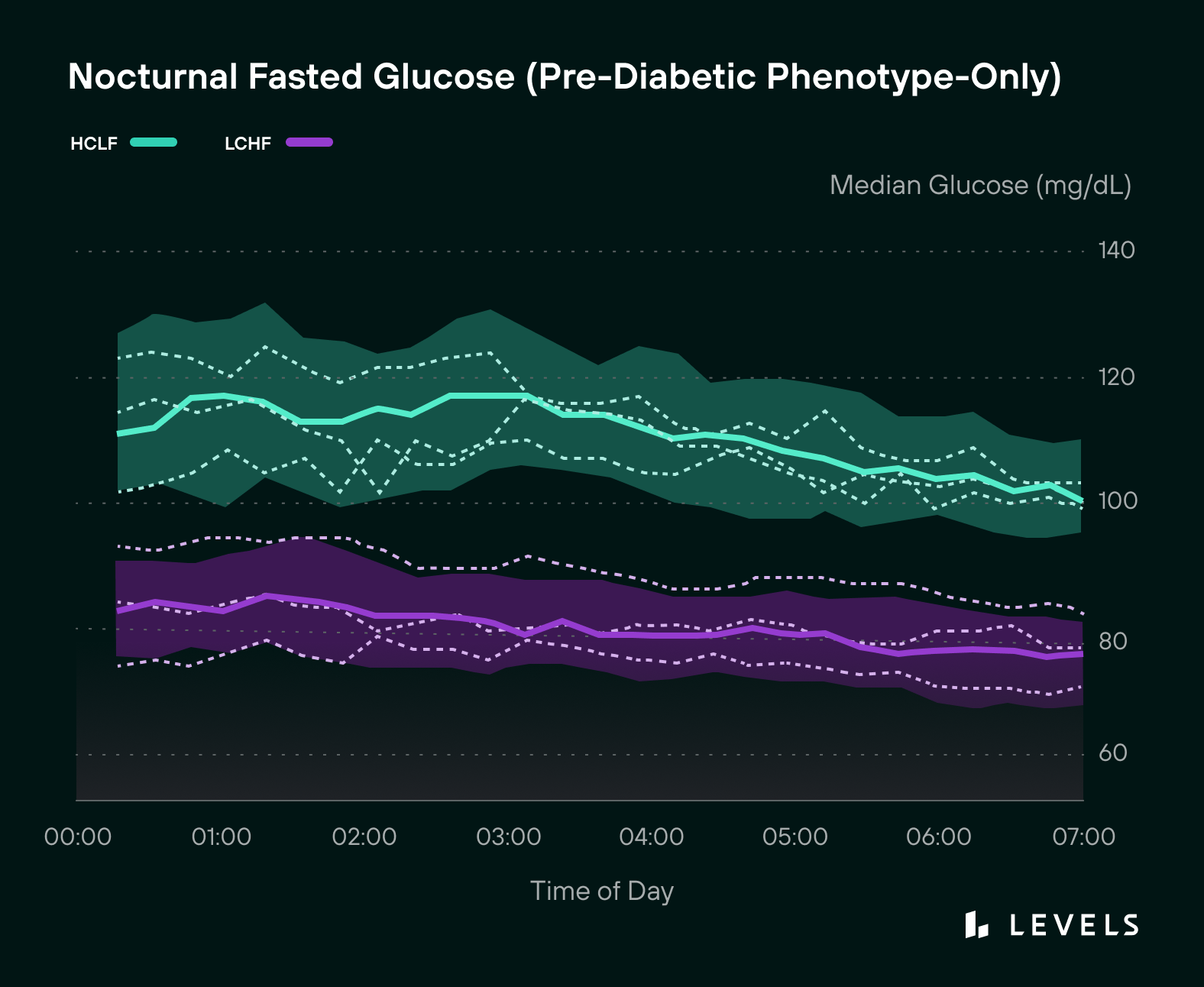
New study finds high-carb diet doesn’t improve exercise performance
Research done in conjunction with Levels finds that packing in the carbs before exercise doesn’t confer any performance benefits.
Note: The study discussed in this article was supported by Levels; participants used Levels software to take their continuous glucose readings. We also assisted in the analysis of the data, and one of the study authors, Dom D’agostino, is a Levels advisor. However, we had no influence on the conclusions of the study.
If you’re thinking about scarfing down a pile of spaghetti or a mound of mashed potatoes the night before the big race, you might want to reconsider. New research is turning the adage about high carb eating to fuel athletic performance on its head.
Eating a high-carb diet—including the practice of filling up on carbohydrate-dense foods before a high-intensity exercise—has been a strategy of top athletes for decades, but new research suggests after at least four weeks of being habituated to it, a low-carb diet offers equivalent benefits in athletic performance and could even lower the risk of developing diabetes.
“The field of sports nutrition has a very high-carbohydrate mentality, and everyone just assumed one diet was better,“ says Phillip Prins, exercise science researcher at Grove City College in Pennsylvania and the first author of the study. “But, from a performance standpoint, there is no difference,” he says.
In a new study published in Frontiers in Nutrition, Prins and colleagues did a side-by-side comparison of two diets in middle-aged male recreational athletes, one high-carb and low-fat and the other low-carb and high-fat. They showed no benefit in running a one-mile time trial or in sprinting performance (in six 800-meter sprints) with either diet. But when athletes were on the high-carb diet, they showed wider swings of blood sugar glucose (measured through continuous glucose monitoring) than the low-carb diet, with nearly one-third of the athletes demonstrating levels consistent with prediabetes.
How High-Carb Eating Took Hold
The first high-carb protocol was developed in the 1960s when Swedish scientist, Gunvar Ahlborg, used new muscle-biopsy techniques to observe carb storage in the body. He found that athletes who consumed excess carbs stored the surplus of resulting glycogen (the stored form of glucose) in their muscles and liver. He hypothesized that these glycogen stores created a bountiful source of fuel that would improve athletic performance. Later, he tested the idea on marathon runners, who reported being able to run longer after carbo-loading compared to moderate carb intake. It’s worth noting that obesity and metabolic health were not nearly the health crises they are today (the rate of Type 2 diabetes in 1960 was just over 1% compared to nearly 10% today.)
Since then, athletes have been trying to stuff their muscles with as much glycogen as possible before a performance. Scientists and exercise nutritionists hailed carbs as the superior nutrient among top athletes. Scientists also theorized that the body uses different nutrients for various levels of exercise. During low-intensity activities, the body burns relatively more fat, but as intensity increases, the body switches over to relatively more carbs. This is called the “cross-over” effect and has been the predominant view for decades despite much direct evidence to support it. But, as the popularity of low-carb diets has grown, so too have studies that challenge the idea that high-carb intake is better for athletic performance. And according to Prins, few high-quality, randomized studies have compared the two diets head to head. He set out to change that.
“The high-carb dogmatic view in sports nutrition has been challenged recently by studies such as ours,” Prins said.
Prins was one of the scientists to test this theory. In 2019, he and a team of scientists in the US and South Africa found that high- and low-carb diets result in equivalent outcomes in athletic performance. In the study, published in the Journal of Sports Science Medicine, researchers prescribed a group of recreational runners a high-carb and low-fat diet for six weeks. Then, they measured their performance in a five-kilometer race. After a short break in which they could eat whatever they wanted, researchers switched them to a low-carb and high-fat diet for an additional six weeks and had them run another race. When he compared the performance between the first and second races, carbo-loading had no benefit. Prins said they controlled the experiment, so exercise and dietary intake were equivalent, meaning participants ate the same number of calories but in different distributions. After an adjustment period of about two weeks, athletes performed just as well on the low-carb versus high-carb regime.
How Low-Carb Fueling Impacts Performance and Health
With neither diet conferring much of a performance advantage, the researchers next looked for a health advantage. In Prins’ new study, researchers evaluated 10 middle-aged athletes who ate two 2500-calorie diets (high-carb and low-carb) consecutively for 31 days each, with a short break between them. This time, in addition to measuring their athletic performance, researchers looked at body mass composition, metabolite oxidation rates using VO2 Max, insulin and glucose levels, as well as cardiometabolic markers like cholesterol and triglyceride levels.
Researchers evaluated how the athletes did in a one-mile time trial and a series of six 800-meter sprints and found no difference in performance between the two diets. Next, they measured fat and carb oxidation, t he rate at which the body uses each nutrient for energy. When athletes were following low-carb diets, they found some of the highest levels of fat-oxidation ever recorded in a study, according to Prins. These findings contradict the long-held belief that carbohydrates fuel high-intensity exercise. “That was really surprising to us,” said Prins. He explains that when you go on a low-carb diet, your body’s ability to utilize fat as energy improves.
he rate at which the body uses each nutrient for energy. When athletes were following low-carb diets, they found some of the highest levels of fat-oxidation ever recorded in a study, according to Prins. These findings contradict the long-held belief that carbohydrates fuel high-intensity exercise. “That was really surprising to us,” said Prins. He explains that when you go on a low-carb diet, your body’s ability to utilize fat as energy improves.
Next, they looked at the health effects in the middle-aged cohort. Athletes on the high-carb diet had significantly higher blood glucose levels both fasting and after meals—conditions that increase the risk of Type 2 diabetes over time. As much as 30 percent of the cohort’s levels climbed to 100 mg/dL and over in overnight glucose values—it’s a small sample size, but these same subjects also had the most significant changes in fat oxidation.
“These subjects had no risk factors for pre-diabetes or diabetes, but continual close monitoring of their glucose patterns over the entire four-week study undercovered that several subjects—even highly-trained, fit athletes—could develop features consistent with pre-diabetes, which were reversed on a low carbohydrate ketogenic diet,” said study co-author Andrew Koutnik. “This is incredibly important because once someone is diagnosed with diabetes, we know that there have already been years of metabolic damage preceding that diagnosis which often goes undetected. Prevention outweighs management.”
Prins says that even people in top shape with vigorous exercise routines can develop diabetes if their diet allows it. “We just assume that athletes are healthy because they are physically active,” he said. “But even they couldn’t outrun their diet.”
Next, Prins plans on doing more fat oxidation studies to further investigate the dogmatic claim that glucose is the body’s primary energy source in high-intensity activities. He says the field lacks good quality evidence on which nutrients are better, but he hopes to change that to benefit athletes’ performance and health.
“We’re not saying one diet is superior, but we’re saying, ‘you as an athlete have been told to exclusively consume carbs, but you have a choice,” he said. “With our research, we are showing that you have a choice.”

What Levels does—and why
Inside Levels

Take control of your metabolic health
Levels helps you see how food and lifestyle affect your health through macro tracking, habit-building, and customized insights and advice. Levels members can also incorporate biomarker data like real-time glucose and metabolic blood testing for an even more personalized experience. Click here to get started with Levels.





